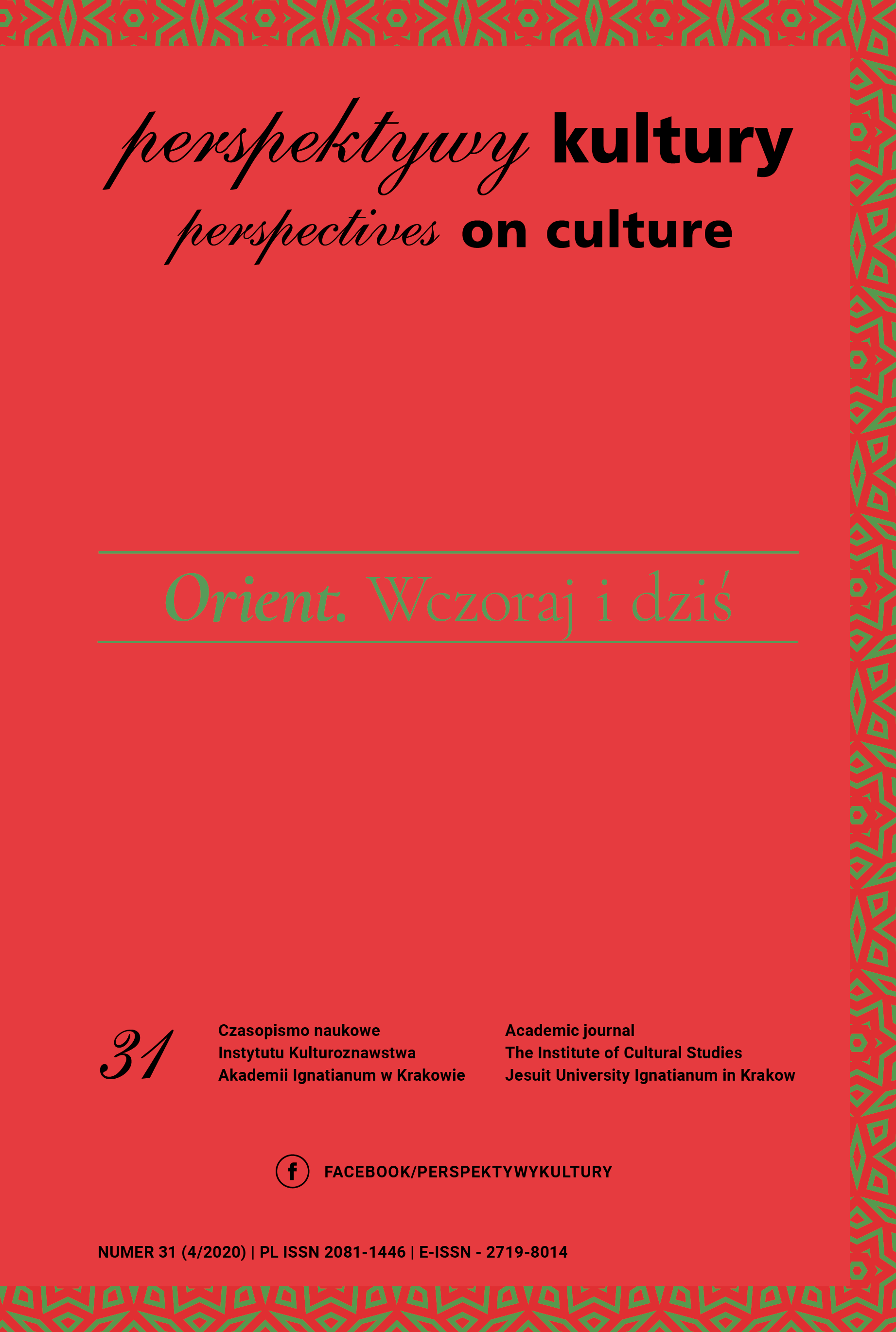Literacka reprezentacja „ja” w średniowiecznych autobiografiach arabskich a kulturowe bariery samopoznania w perspektywie teorii piśmienności. Część 2
Abstrakt
Artykuł podejmuje problematykę związku pomiędzy wpływem pisma na procesy poznawcze a cechami kultury, w obrębie której przyjęcie pisma następuje. Jako perspektywę badawczą przyjęto klasyczną teorię piśmienności, sprofilowaną wprowadzonymi do niej z czasem modyfikacjami. Zgodnie z nimi zmiana procesów i treści poznawczych następująca pod wpływem pisma nie ma charakteru automatycznego. Każda kultura dysponuje określonym zasobem czynników oddziałujących na pismo oraz piśmienność i decydujących, w jakim stopniu potencjał pisma zostanie wykorzystany. Celem artykułu jest wskazanie najistotniejszych kulturowych norm i wartości, które – będąc obecne w praktyce społecznej – mogły ograniczyć możliwości oddziaływania pisma na procesy samopoznawcze, a których konsekwencje obecne są w literackim obrazie „ja” w średniowiecznych arabskich autobiografiach XII–XV wieku. Cechy te określono jako: tradycjonalizm, przewagę świadomości zbiorowej nad indywidualną, akceptację dla hierarchiczności oraz koraniczną wizję granic wolności człowieka.
Bibliografia
Abū Shāma, Shihāb ad-Dīn ‘Abd al-Rah????mān. (1974). Adh-Dhayl ‘ala-r-rawd????atayn, ‘I. al-H????usaynī ad-Dimashqī (Ed.). Beirut: Dār al-Jayl.
Enderwitz, S. (1998). From Curriculum Vitae to Self-narration. Fiction in Arabic Autobiography. In S. Leder (Ed.), Story-telling in the Framework of Non-fictional Arabic Literature (pp. 1–19). Wiesbaden: Harrassowitz Verlag.
Enderwitz, S. (2007). Autobiography and “Islam”. In O. Akyıldız, H. Kara & B. Sagaster (Eds.), Autobiographical Themes in Turkish Literature: Theoretical and Comparative Perspectives (pp. 35–42). Würzburg: Ergon Verlag.
Al-Ghazālī, Abū H????āmid. (1980). Deliverance from Error (al-Munqidh min al-Dalāl) (R.J. McCarthy, Trans.). Boston: Twayne, American University in Beirut.
Al-Ghazālī, Abū H????āmid. (1992). Al-Munqidh min ad????-d????alāl (M. Bijū, Ed.). Damascus.
Al-Ghazālī, Abū H????āmid. (2001). Deliverance from Error and Mystical Union with the Almighty (M. Abulayah, Trans.). Washington D.C.: The Council for Research in Values and Philosophy.
Giladi, A. (1992). Children of Islam: Concepts of Childhood in Medieval Muslim Society. London: Macmillan.
von Grunebaum, G.E. (1971). Medieval Islam: A Study in Cultural Orientation. Chicago—London: The University of Chicago Press.
Guillaume, A. (Ed. & Trans.). (2004). The Life of Muh????ammad. A Translation of Ish????āq’s Sīrat Rasūl Allāh. Karachi: Oxford University Press.
Gurevich, A. (1985). Categories of Medieval Culture. London—Boston—Melbourne—Henley: Routledge & Kegan Paul.
Haslam, A. (2004). Psychology in Organizations. The Social Identity Approach. London: Sage Publications.
Hofstede, G. (2001). Culture’s Consequences. Comparing Values, Behaviors, Institutions and Organizations across Nations. London—New Delhi: Sage Publications.
Hofstede, G., Hofstede, G.J. & Minkov, M. (2010). Cultures and Organizations. Software for the Mind. New York: McGrow Hill.
Izutsu, T. (2002). Ethico-Religious Concepts in the Qur’ān. Montred & Kingstad—London—Ithaca: McGill-Queen’s University Press.
Izutsu, T. (2008). God and Man in the Qur’ān. Semantics of the Qur’ānic Weltanschauung. Tokyo: Keio University Press.
Kadivar, M. (2003). The Public, Private, and Islam. Social Research 570/3: 659–680.
Kmita, J. (1982). O kulturze symbolicznej. Warszawa: Centralny Ośrodek Metodyki Upowszechniania Kultury.
Lane, E.W. (2003). Arabic-English Lexicon (CD-ROM ed.). Vadus, Liechtenstein: Thesaurus Islamicus Foundation.
Lindsay, J.E. (2005). Daily Life in the Medieval Islamic World. Westport, Connecticut—London: Westwood Press.
Lowry, J.E. (1997). Time, Form, and Self: Autobiography of Abū Shama. Edebiyāt 7: 313–325.
Mrozek, A. (1967). Koran a kultura arabska. Warszawa: Książka i Wiedza.
Nasalski, I. (2006). Kiedy muzułmanin porzuca swą wiarę. Apostazja w islamie. Teofil. Pismo Kolegium Filozoficzno-Teologicznego Dominikanów 2 (24): 101–124.
Ong, W.J. (2005). Orality and Literacy. The Technologizing of the Word. London—New York: Routledge.
Pilarska, A. (2012). Ja i tożsamość a dobrostan psychiczny. Poznań: Wydawnictwo Naukowe Wydziału Nauk Społecznych UAM.
Prochwicz-Studnicka, B. (2020). Literary Representation of the Self in Medieval Arabic Autobiographies and the Cultural Barriers to Self-Cognition. The Literacy Theory Perspective. Part 1. Perspektywy Kultury 30: 135–150.
The Qur’an. A New Translation (A.M.A.S. Haleem, Ed. & Trans.). (2004). Oxford: Oxford University Press.
Radtke, B. & O’Kane, J. (1996). The Concept of Sainthood in Early Islamic Mysticism. Two Works by Al-Hakim At-Tirmidhi. An Annotated Translation with Introduction. Richmond, Surrey: Curzon Press.
Rapoport, Y. (2005). Marriage, Money, and Divorce in Medieval Islamic Society. Cambridge—New York—Melbourne: Cambridge University Press.
Reynolds, D.E. (2001). Interpreting the Self: Autobiography in the Arabic Literary Tradition. Berkeley: University of California Press.
Robinson, Ch.F. (2007). Islamic Historiography. Cambridge: Cambridge University Press.
Rosenthal, F. (2007). Knowledge Triumphant. The Concept of Knowledge in Medieval Islam. Leiden: Brill.
Rosenthal, F. (2014a). Child Psychology in Islam. In D. Gutas (Ed.), Man versus Society in Medieval Islam (pp. 941–964). Leiden—Boston: Brill.
Rosenthal, F. (2014b). Materials for an Appraisal of Knowledge as Societal Force. In D. Gutas (Ed.), Man versus Society in Medieval Islam (pp. 967– 1000). Leiden—Boston: Brill.
As????-S????uyūt????ī, Jalāl ad-Dīn. (1975). Kitāb at-tah????adduth bi-ni‘mat Allāh (E.M. Sartain, Ed.). Cambridge: Cambridge University Press.
Turner, J.C. (1982). Towards a Cognitive Redefinition of the Social Group. In Social Identity and Inter Group Relations (H. Tajfel, Ed., pp. 15–40). Cambridge UK: Cambridge University Press.
Yāqūt al-H????amawī, Ibn ‘Abd Allāh. (1993). Mu‘jam al-udabā’. Irshād al-arīb ilā ma‘rifat al-adīb (I. ‘Abbās, Ed., Vol. 5). Beirut: Dār al-Gharb al-Islāmī.
Copyright (c) 2020 Akademia Ignatianum w Krakowie

Utwór dostępny jest na licencji Creative Commons Uznanie autorstwa – Bez utworów zależnych 4.0 Międzynarodowe.
Autor, zgłaszając swój artykuł, wyraża zgodę na korzystanie przez Wydawnictwo Uniwersystet Ignatianum z utworu na następujących polach eksploatacji:
- utrwalania utworu w formie papierowej, a także na nośniku cyfrowym lub magnetycznym;
- zwielokrotnienia utworu dowolną techniką, bez ograniczenia ilości wydań i liczby egzemplarzy;
- rozpowszechniania utworu i jego zwielokrotnionych egzemplarzy na jakimkolwiek nośniku, w tym wprowadzenia do obrotu, sprzedaży, użyczenia, najmu;
- wprowadzenia utworu do pamięci komputera;
- rozpowszechniania utworu w sieciach informatycznych, w tym w sieci Internet;
- publicznego wykonania, wystawienia, wyświetlenia, odtworzenia oraz nadawania i reemitowania, a także publicznego udostępniania utworu w taki sposób, aby każdy mógł mieć do niego dostęp w miejscu i czasie przez siebie wybranym.
Wydawca zobowiązuje się szanować osobiste prawa autorskie do utworu.





